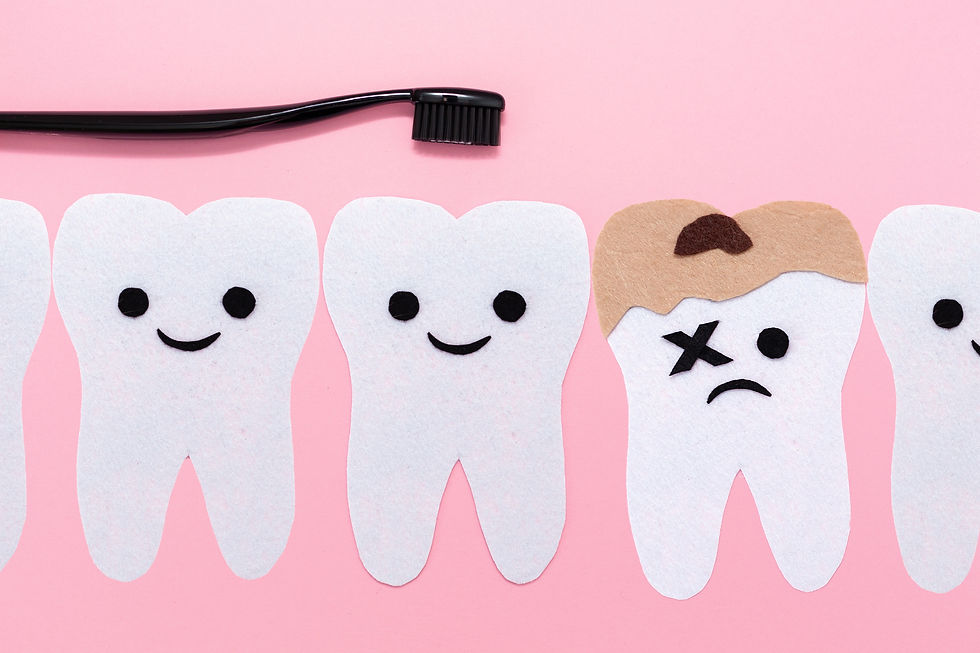Seattle, WA Residents Ask: What is Baby Bottle Tooth Decay? Learn With Family & General Dentist
- Zen Dental Center

- Feb 1, 2022
- 3 min read
Updated: Feb 15, 2022
Baby teeth may be temporary, but they are incredibly important! They play a big role in a growing child’s speech, digestion, and social development, and also serve as placeholders that help guide adult teeth into their correct positions. And because they’re so important to a young child’s health and development, it is very important to prevent cavities in baby teeth.

What is Baby Bottle Tooth Decay?
Tooth decay in infants and toddlers is called baby bottle tooth decay (also called early childhood caries or nursing caries). If your child develops cavities in their baby teeth, issues like pain, infection, and premature tooth loss may result.
These are serious dental health issues - even in temporary baby teeth - and can lead to speech problems, difficulty chewing and eating, increased self-consciousness, disrupted learning, and crooked adult teeth. Baby bottle tooth decay most commonly occurs in the upper front teeth, but other teeth may also be affected.

What Causes Baby Bottle Tooth Decay?
The biggest cause of baby bottle tooth decay is frequent and prolonged exposure to sugary drinks. For example:
Allowing babies to go to bed with bottles filled with juice or other sugary drinks, or
When a juice/sugary drink-filled bottle is frequently used as a pacifier.
Other common causes of early childhood caries include:
When cavity-causing bacteria is passed from the caregiver to the infant via saliva; such as when the caregiver cleans their baby’s feeding spoon or pacifier with their mouth and then gives the spoon/pacifier directly back to the baby.
If your infant or toddler does not receive an adequate amount of fluoride, they may be at higher risk of developing cavities. It should be noted that too much fluoride before the age of 8 can cause fluorosis (permanent stains to teeth). Ask your dentist if you are unsure if your baby is receiving the adequate amount of fluoride.

How to Prevent Baby Bottle Tooth Decay
Early childhood caries are fortunately very preventable. Here’s a simple checklist for avoiding cavities in your little one’s teeth, from infancy through toddlerhood!
Don’t put your baby to bed with a bottle of juice, or any other sugary drink. Try to have your infant finish their bottle before they naptime or bedtime.
Try to avoid filling bottles/sippy cups with any liquids besides milk, formula, or water.
Do not use a bottle or sippy cup as a pacifier.
Don’t dip pacifiers in sugar or honey – and remember, babies under the age of 1 should never consume honey because it increases their risk of infant botulism, a serious health condition.
Don’t “clean” your child’s spoons or pacifiers by putting them in your mouth. Instead, rinse them with water before giving them back to your child.
After each feeding, gently wipe your child’s gums with a clean, damp washcloth (age 0-12 months, or until their first teeth erupt).
When your child’s teeth begin erupting, brush them gently every day with a child-sized toothbrush and a small smear of non-fluoride toothpaste.
Foster healthy eating habits and a balanced diet that is low in sugar.
Bring your little one in for their first dental appointment by their first tooth or their first birthday - whichever comes first!
No matter how young a child is, it is never too early to care for their oral hygiene and health. After all, healthy adult teeth stem from healthy baby teeth!
#babybottletoothdecay #earlychildhoodcaries #cavities #toothdecay #caries #oralhealth #oralhygiene #preventcavities #dentalhealth #kidsdentist #childrensdentist #bestdentist #familydentistry #cosmeticdentistry #emergencydentist #dentalimplant #affordabledental #generaldentistry #seattlewa #zendentalcenter





.png)


